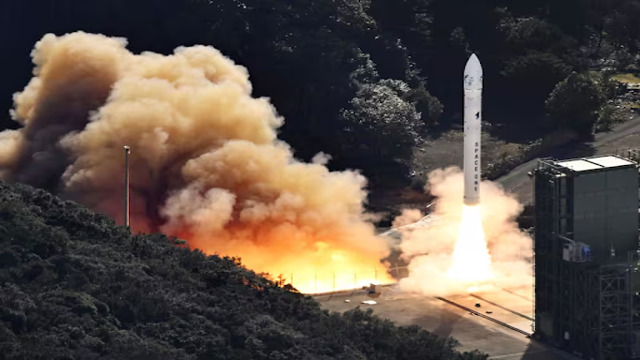
The Kairos No. 2 rocket, a commercial launch vehicle from Japan, took off from Space Port Kii in Kushimoto town, western Japan, on Wednesday, December 18, 2024, carrying a batch of satellites. (AP Photo)
A Japanese space startup, Space One, was forced to abort its second attempt to launch a rocket carrying satellites into orbit on Wednesday, just minutes after liftoff. The launch, which took place from a coastal site in Wakayama, central Japan, ended in failure, as the rocket destroyed itself three minutes after taking off. This was a second setback for the company, which had experienced a similar issue nine months ago during its first launch attempt.
Space One’s Kairos No. 2 rocket was meant to carry five small satellites, including one from the Taiwanese space agency and several from Japanese startups. However, the company had to abort the mission after determining that the rocket was unlikely to complete its journey into space. Masakazu Toyoda, Space One’s president, expressed his regret over the situation but remained optimistic. “We are very sorry that we could not achieve as far as a final stage of the mission,” he said in a statement. “We don’t consider this a failure because we are getting valuable data that will help our pursuit toward a next challenge.”
The rocket, which had risen over 100 kilometers (60 miles) above the Earth’s surface, had entered space before it was destroyed. Space engineers suspect the problem stemmed from an abnormality in the rocket's first-stage engine nozzle or its control system, causing an unstable flight. The rocket started spiraling mid-flight and triggered its autonomous safety system, which led to the destruction. Mamoru Endo, a company executive and space engineer, said the problem appeared to be in the nozzle or its control system.
The failed launch is particularly significant for Space One, which has high hopes of becoming Japan's first private company to successfully put a satellite into orbit. The company was founded in 2018 with the goal of boosting Japan’s space industry and offering affordable space transport services. In this venture, Space One aims to compete with other global space programs, including those in the United States. The company has faced setbacks, including a failed debut flight in March, when the rocket was intentionally destroyed after five seconds due to a miscalculation in the propulsion system.
Wednesday’s launch had been delayed twice due to strong winds before it was attempted. Space One is still determined to succeed in its goal of creating a small, affordable rocket capable of launching satellites into orbit. The company aims to offer up to 20 launches per year, which would provide a contrast to Japan’s government-led space program, which currently plans only six launches annually.
Space One’s rocket was carrying valuable scientific payloads, with the Taiwanese space agency’s satellite being a key component of the mission. Despite the failure, the company is determined to fix the issues and is already planning for the next attempt. As Toyoda noted, the data from this flight, although not ideal, will provide important insights to help the team address the technical challenges and move forward.
Japan’s space program, led by the Japan Aerospace Exploration Agency (JAXA), has made significant strides with larger rockets such as the H3 and Epsilon rockets. However, Space One hopes that its smaller, more frequent launches will provide a cost-effective and regular solution for satellite transport.















